How to Build a Hotel App for Online Booking to Bite off the Booking’s Share
16 min read
Page Content
- 1. Hotel Booking App Market Overview
- 2. Why Create Mobile App Like Booking
- 3. Things to Consider Before Developing Hotel Reservation Apps
- 4. MVP and Sophisticated Features of a Hotel Booking App
- 5. Tech Stack Needed to Build a Hotel Booking App to Save Costs and Scale Easy
- 6. Hotel Apps Monetization Models
- 7. 7 Steps to Build a Hotel Mobile App and Launch Successfully
- 8. Codempire’s Experience in Creating Hotel Apps
- 9. Conclusion
The idea to start a hotel booking app after the coronavirus pandemic may not seem promising.
Due to the Pandemic, the occupancy rate of hotel rooms fell to a record 24%.
Revenue per available room (RevPAR) decreased by as much as 60% in 2020.
In addition, many economists are talking about a possible recession in 2023, the prerequisites of which we can already see, as we have the highest inflation in 4 decades of 9,1%, and the closing of vacancies at such leading global companies as Meta and Twitter.
But don’t rush to conclusions.
Travelport estimates that the travel industry had recovered about 50% of pre-lockdown profits by the end of 2021. This indicator is expected to increase to 85% in 2022.
In terms of numbers, the travel sector crossed the $800 B mark in 2021 at a CAGR of 19%.
Such a high intensity is due to the exit from quarantine restrictions, and the indicators will become more modest but more stable in the nearest future.
As for the recession, according to data collected by Bloomberg, it’s possible but not as damaging as the Covid-related crisis.
The industry GAGR is predicted to be 7% during 2021-2025. By the end of this period, the hospitality market value will cross the $1 trillion mark.
Regarding profitability, McKinsey’s forecast claims that the hotel sector will likely catch up to the previous RevPAR level in 2023.
Hotel Booking App Market Overview
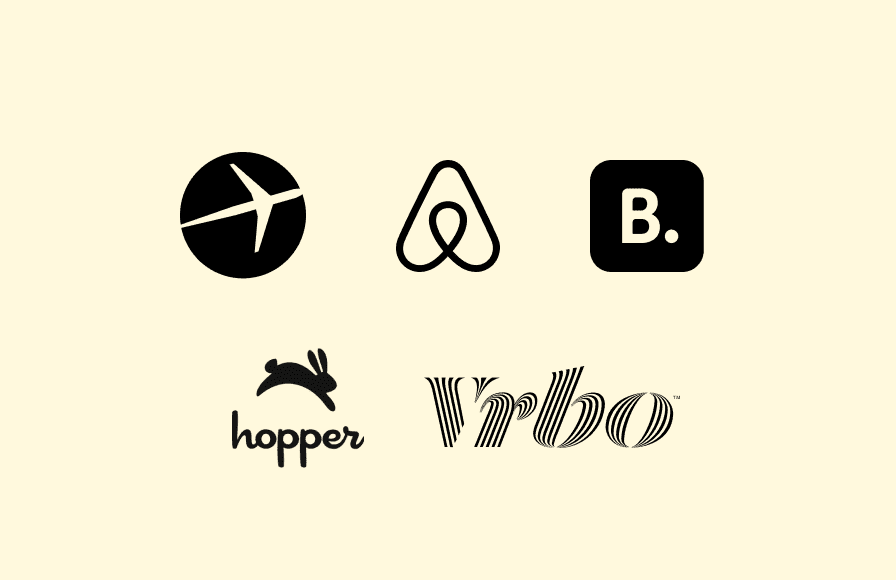
These are market leaders among travel apps, the first three of which are on the list of world-leading companies according to Statista at the end of 2021:
-
Airbnb
It is a giant in the hospitality industry, with 150+ Mln users, whose revenue reached $6,847,089,383 in 2021, which is almost twice as much as in 2020.
This platform works as an intermediary between people who need inexpensive and high-quality housing while traveling and lessors who earn from rent.
The project gets profit through fees charged at the time of booking from both the tenant and the homeowner.
Providing comfort and safety for both parties, Airbnb has gathered a huge audience and has become a success story for 81000 cities in 200 countries around the world.
-
Booking.com
It’s the largest online booking service and the closest competitor to Airbnb. But if the first specializes in renting private housing, then Booking.com specializes in hotels and hostels. Its total revenue is estimated at $12.51 B, and the total value is $96.3 B.
The service works on a commission-based monetization model, receiving a percentage of each reservation from the hotel.
-
Expedia
It’s an online travel agency available to users in 70 countries. Unlike the previous two products, this one offers ticketing, car rental, cruise ship, and vacation deals in addition to accommodation/hotel booking.
Its profit amounted to $8.6 B in 2021, which is 65% more than the previous year.
70% of the company’s profit comes from booking services, based on a commission-based model.
-
Hopper
It’s a travel marketplace with 70 Mln users. It offers a wide range of travel services, including booking tickets, hotel rooms, and planning journey budgets with the help of fintech services. The total cost of the product is $5 B.
-
Vbro
It’s a private housing rental service with 2 Mln listings. The service earns commissions from each booking, guest service, or offers users pay for an annual subscription, which costs $499. The company’s profit in 2021 exceeded $2 B.
Why Create Mobile App Like Booking
The solution to create a hotel booking app is extremely apt both for hotel owners and b-to-b startups.
First, it allows you to reach a huge audience of potential customers.
It is impressive that 83% of US adults now prefer to book their travel online. And at the same time, it is easy to understand. After all, booking a trip online is trivially convenient, fast, and available almost anywhere.
Secondly, it is process automation.
According to 2018 data, 82% of all travel bookings globally are completed without human interaction.
It’s not difficult to guess that people like automated services, so they will enhance customer loyalty.
So, in general, thanks to the creation of the hotel application, business owners can:
- cover most of the consumers of hotel services;
- save on payment of working hours for administrators;
- avoid human errors in accommodation management;
- provide customers with round-the-clock available service.
Weighing the risks before opening an online booking business?
Contact us and get budget advice and estimate from the pro team!
Contact usThings to Consider Before Developing Hotel Reservation Apps
We’ve collected several key points to consider that will help make a hotel reservation app with optimized costs and reduced risks.
Types of Hotel Booking Apps
The type of application determines the set of technologies required for implementation, the monetization model, and the budget. So, the main types of travel software:
- Online travel agencies such as Expedia, TripAdvisor, or Agoda. They provide a wide range of services for travel planning - from hotel booking and flight ticket sales to car and cruise boat rentals. Such services receive profit from subscriptions, fees, and advanced service packages.
- Accommodation booking services or hotel chain apps. Here, the key points will be to provide a base of reliable lessors - if it’s a short-term housing lease, an advanced search engine, and an extensive admin panel with access levels. Such projects can be monetized through booking fees, marketing tools, and paid listings for home/hotel owners.
- Aggregators such as Hopper or Kayak. They use algorithms to collect data on available tickets/hotels and analyze how their prices have changed. Further, based on this data, they generate an offer with the most favorable prices and time. The main challenge is to ensure accuracy. For example, at Hopper, this indicator reaches 95%. Such applications can be monetized through booking fees or fintech services to third-party companies (as Hopper does).
Distribution Area of Your Hotel App
Distribution strategy is an answer to how to develop a hotel booking app that will bring profit. This tool can provide the business with revenue and a wide audience of customers. It’s the plan by which you will distribute your product. So, here are some basic ways to promote your hotel app:
- Global distribution systems. Such services as Amadeus, Apollo, Worldspan, Galileo, and Pegasus are widely used by tour operators. Place your hotel there - so that it gets into their field of vision.
- OTAs. Place your hotel in similar services with links to your own site/app. Online travel agencies are large-scale resources with a huge audience, and it will be easier to gain recognition thanks to them.
- Metasearch engines. 75% of travelers use them when planning a trip. Google, Yahoo!, Dogpile, MetaCrawler, and SUSI - use their platforms to gain visibility among travelers.
- Promotion of direct bookings. It’s great if your hotel service is available in all distribution channels. But the main goal is to attract customers to your own platform. Use discounts and special offers for direct booking to encourage travelers’ loyalty.
Steps to Save Cost to Build
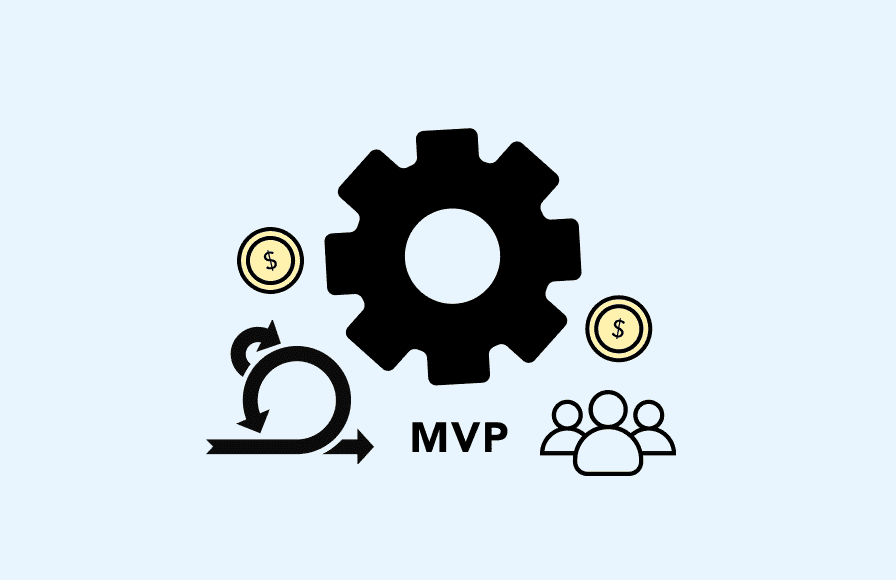
The key here is the organization of the hotel mobile apps development process:
-
MVP. This is a classic that helps to save the budget and reduce financial risks. You make a minimum set of functions and gradually expand it according to feedback without risking creating unneeded functionality. In addition, you quickly launch a product on the market, making a profit, and significantly expanding investment prospects with relatively small investments.
-
Methodology. Scrum and Agile make hotel booking app development coherent and smooth, helping avoid delays and confusion. That is why more than 70% of American companies use Agile. Moreover, more than 90% of respondents use these methods together.
-
Reliable team. Your goal is an affordable price and high quality at the same time. Setting up a team by yourself, paying for the office, and dealing with all organizational issues aren’t cost-effective.
You can’t count on high-quality communication, clear deadlines, and expertise working with freelancers.
Better consider the outsourcing option. With it, you’ll get a great price-quality ratio and avoid delay risks, rent issues, team setting, and communication problems.
The main thing is to ensure that you’ll have transparent cooperation terms and justified pricing. Also, check potential partners’ ready-made cases and previous customers’ reviews to confirm their expertise.
Calculating funds for your travel app?
Get smart budgeting and a preliminary estimate from the pro discovery team!
Contact usMVP and Sophisticated Features of a Hotel Booking App
To build an MVP successfully, you should plan the development process and divide the feature list into mandatory and optional functions. Based on our customers’ and global travel industry leaders’ experience, we’ve compiled a list of features, including must-haves and additional ones.
Key Features of a Hotel Booking App
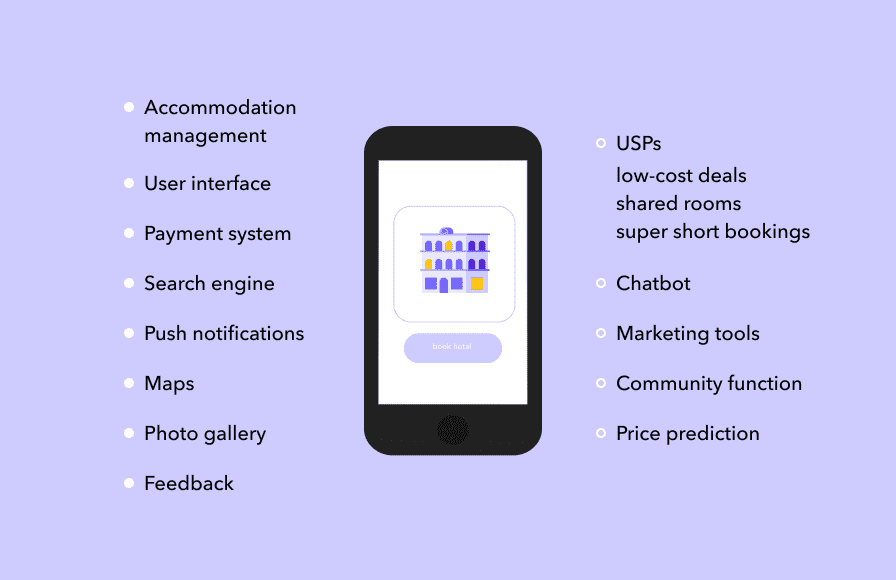
- Accommodation management is the first feature to implement when you make a hotel app. According to Statista, room booking and related functions are in the top 3 most requested among users of travel solutions. They are the reason to use booking applications for more than 50% of customers.
- User interface should include transfer, cancellation of flights/accommodation, booking history, travel planner, and room status tracking functions. It will be great to add personalized offers, the ability to add to “favorites” and compare hotels according to a set of criteria - to facilitate and speed up the search for a place to stay.
- The payment system of your travel application should allow the user to pay in various currencies and services. And it is worth worrying about security - a payment gateway will be the apt tool for this.
- Search engine with categories and filters - 100% must-have for a travel application. Otherwise, your customers will experience frustration due to a long and confusing search for booking a hotel.
- Push notifications. Reminders about reservations or any changes in the schedule are an absolute necessity to ensure control and awareness for travelers.
- Maps are essential for convenient navigation. Hotels must be linked on a map, and their location should display on the profile page. It can be implemented by linking services such as Google Maps.
- A photo gallery with pictures of the hotel rooms, exterior, and restaurant also should be included in the hotel profile. It would be great if travelers could also add their own photos taken during the trip. Ensure that the materials are up-to-date and trustworthy.
- Feedback, Ratings, and the ability to review hotel services are obligatory. It’s impossible to build a hotel app according to the Build-Measure-Learn cycle without these tools. All future modifications of your app will base on it.
Features to Create WOW Customer’s Experience
- According to statistics, 44% of travelers plan trips less than a month before departure, and a half make purchases under the influence of last-minute offers. Therefore, such USPs as low-cost deals, shared rooms, and super short bookings will help you attract this audience segment.
- Chatbot for the voice-booking - firstly, convenient, and secondly, available anytime because the user doesn’t have to wait for working hours to plan, adjust or cancel a ticket/booking.
- Marketing tools will help you monetize your hotel booking app, especially if you have a wide range of hotels. Thus, guests get discounts and cost-effective offers, hotels get more customers, and your app earns a profit.
- The Community function is an obvious plus for the customer experience. The ability to communicate with other travelers, share favorite places, meet and plan joint trips will contribute to customer loyalty.
- Price prediction (as the Hopper app has) can attract travelers who want to optimize travel expenses. The point is to provide accuracy. As for the considered application, the calculations are 95% accurate. It could be laborious to achieve, but in the case of success, users will love it and become your regular customers.
Tech Stack Needed to Build a Hotel Booking App to Save Costs and Scale Easy
Based on the experience of our own and world-known projects of various scales and orientations, we have formed the best Fitting multi-purpose technology stack for hotel booking mobile app development - React stack. Currently, it is the most popular framework, according to Statista. In particular, such leading products as Hopper and Airbnb use React.
Let’s consider its pros according to the following criteria:
- Performance. Smooth and fast playback of animations, loading of pages, and dynamics of reactions are extremely important for the user experience. And React technology provides it.
- Budget. Hybrid development will allow you to save up to 30% compared to native because you will spend half less time and resources developing an application for iOS and Android at once.
- Flexibility. With React, your app will deliver high performance and won’t break when scaling and changing. This flexible technology is suitable for both large and small projects.
- A team setting. React is widely known, relatively easy, and affordable to learn, so you’ll have a rich selection of experienced specialists to hire.
- Community support. Thanks to it, you’ll facilitate project implementation because almost any problem already has a solution available in public access.
Looking for technical advice?
Contact us, and we'll consider your idea in detail and provide an estimate for free!
Contact usHotel Apps Monetization Models
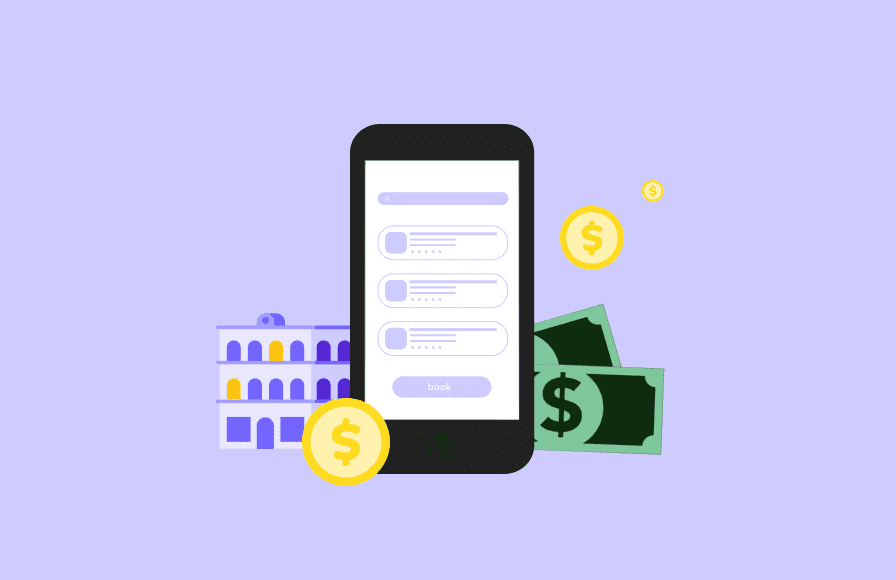
You need to develop a monetization plan to build a hotel booking app and make it profitable. It can be based on the following models or combine several of them.
Commission-based model
It’s the most popular model used in all types of travel software.
The point is that the app gets a small percentage of each booking.
Paid subscription
Such top apps as TripAdvisor Plus, Expedia Rewards, and Vbro use this model. It gives a stable income to the project owner, and travelers get more profitable prices and offers. However, it’s not suitable for people who don’t travel often.
FinTech services
What if we say that you can build an app for hotel to earn money from other booking services?
We can see this model in aggregators that analyze available offers and their price dynamics, generating the most cost-effective booking options for the user. For example, Hopper Cloud sells its software and licenses it to other travel products such as Trip.com, KAYAK, and Capital One.
Ads and marketing tools
This kind of income is most suitable for hotel chain apps. The point is to allow hotels to promote their offers. It can be pop-ups, advantageous placement in the rating, discount programs, or direct advertising.
Additional services for extra payment
With this model, you can offer travelers additional functions, a package of advanced services, or more favorable offers. It can be, for example, Guest services fees or an advanced booking engine with a voice chatbot.
7 Steps to Build a Hotel Mobile App and Launch Successfully
Define the idea
Before you start to create a hotel app, decide on the following questions:
- What kind of product will it be? An aggregator, a travel agency, a hotel booking service, or a travel planner?
- What is the uniqueness or relevance of the mobile platform? How can it bypass competitive solutions?
- What is the main concept of the idea? What is the purpose of the business project, and what customer pains will it solve?
Put your idea on paper by creating technical documentation. It will give an understanding of what to start from in further work.
Research & Consulting
Research the market and competitors, choose a reliable mobile development services company, or assemble a team yourself.
To avoid common mistakes, you can turn to experienced discovery teams that will approximately estimate your project and advise on technologies and methods. They can also consult you about the cost to build an app.
Prototyping
At this stage, UI/UX specialists create the prototype and design. It will give a crude idea of the future project, which means a better understanding for the dev team and improving financial prospects - as it will encourage investors to allocate funds.
Planning an MVP stage
Hotel app development planning includes the following steps:
- Define technologies and methods. Choose a time-saving, budget-optimizing, and flexible stack and methodology.
- Divide total work volume into milestones. Make preliminary estimates and define implementation terms.
- Distribute the feature list into main and additional ones. The first will be implemented at the MVP development stage, while the rest - after the launch within the Build-Measure-Learn cycle.
Testing & Development
At this stage, the dev team creates the front end, back end, and server parts (API). The milestone-based approach involves instant testing as it`s an ensured method how to create a hotel booking app timely and qualitatively.
According to this method, a new milestone doesn’t start until the previous one is analyzed and bug-fixed. This way, you’ll know about all changes on time, avoiding delays and accumulation of problems with the functioning of your mobile application.
Deployment
This step requires timely communication with the development team and full control for a quick and successful product launch. CI/CD technology is best suited for this purpose. It prevents inconsistencies between development and operating processes and also provides automation of software testing, development, and launch.
Post Launch Improvement
The correct selection of technologies is the answer to how to make a hotel booking app that can adapt to modifications and expansion. The priority is speed, flexibility, and high-end performance.
After all, you will collect feedback based on which you will plan and implement improvements for your application. It’s the essence of the Build-Measure-Learn Cycle.
Planning to develop a travel application?
We'll gladly assist with the market analysis and estimation stage to post-launch development!
Contact usCodempire’s Experience in Creating Hotel Apps
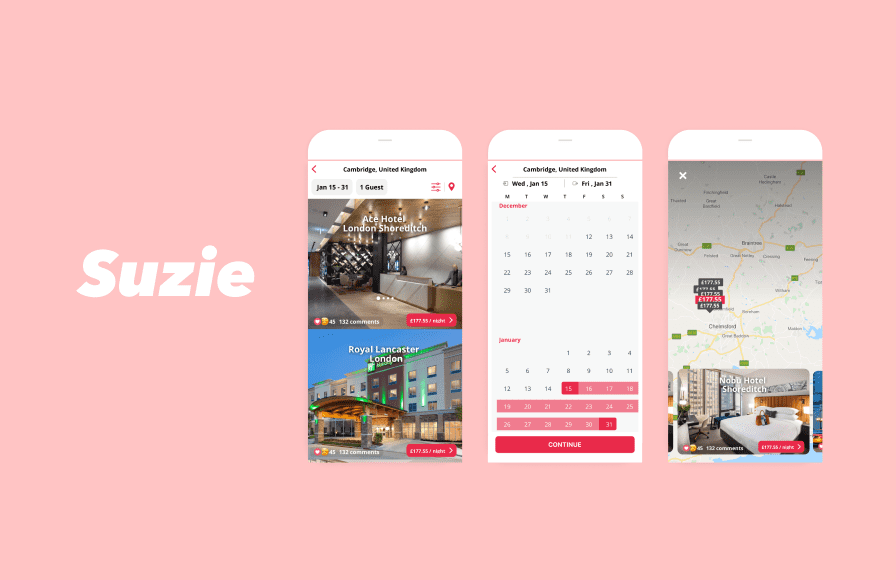
Suzie is a hotel app for travel planning and booking tickets/accommodations, the idea of which belonged to our technical partners from London.
The task was to design a hotel booking application similar to Booking.com but with a unique community function. It assumed the connection between travelers, namely the opportunity to find new friends, based on the mutual liking principle.
The development process was organized according to the Scrum Agile methodology, using ReactNative, TypeScript, and Firebase technologies.
Our hotel booking app development company needed 6 months and a team of 4 engineers to implement the project, including such features as:
- 3-click accommodation booking;
- voice management of reservations through a chatbot;
- trip planner with ticket comparison aggregator functions;
- safe and variable payment options;
- advanced community function for travelers;
- search engine with categories and filters.
The result for the customer is a unique ready-made application on the iOS and Android platforms, which has more than 2,000 registered hotels in Great Britain after 2 years of successful work.
Conclusion
Despite the temporary decline in the travel and hospitality industries caused by the Covid pandemic, this area is quickly making up for losses and bringing in hundreds of billions in revenue.
Even the recession expected in 2023 does not make this industry unprofitable. Instead, it will continue growing to $1 trillion by 2025.
The vast majority of travelers book trips online, and automation allows you to achieve an outstanding user experience, ensuring the competitiveness of your hotel business.
To make your business a success story, you should focus on the experience of world leaders such as Booking.com, Trip Advisor, Expedia, and others.
It’s a difficult task that requires a well-thought-out strategy, an optimizing tech stack, and advanced development methods. You also have to take care of monetization and distribution channels.
But with the help of specialists, pro technical advice, and trustworthy technical partners, you can develop a hotel booking app that will increase your hotel’s customer base, make your business more competitive, and give it unlimited development prospects!
#productivity
#startup
#MVP